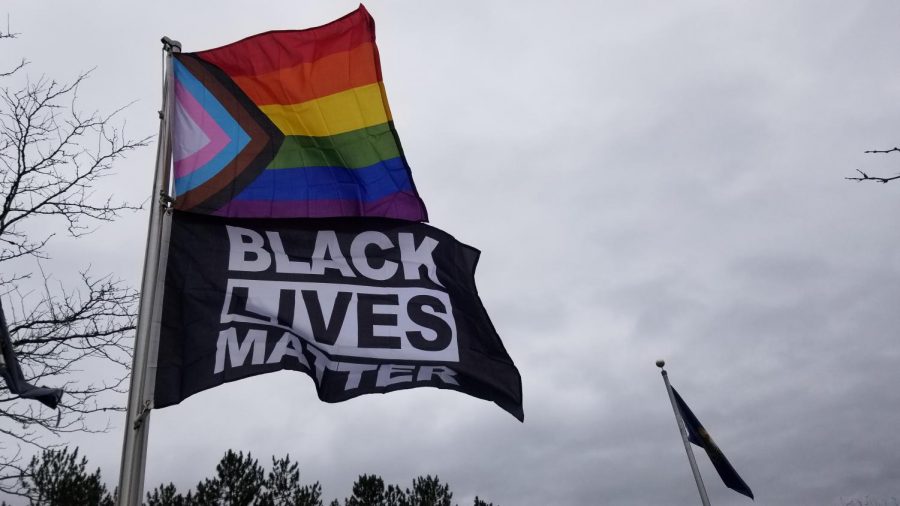VSCS Board of Trustees adopts anti-racist pledge
After over a year of revisions, the Vermont State Colleges System’s Student Diversity and Inclusion Task Force has succeeded in creating an anti-racism pledge for the institution.
The pledge was adopted by the Board of Trustees on their Monday, Oct. 25 meeting following its recommendation by the board’s Diversity, Equity and Inclusivity committee, which approved it for presentation during their Friday, Oct. 15 meeting.
“You’re so brave to come and talk to use today about the passionate pledge that you have,” Committee Chair Shirley Jefferson to the students after the motion passed on Oct. 25. “I’ll help you in any kind of way that I can.”
On the Oct. 15 meeting, members of the task force were given an extended period of time to share their reasoning for the pledge, the support the pledge has received and some of their experiences with racist behavior on various VSC campuses.
“At the Johnson campus, we have a strong family dynamic. However, it’s not safe for students of color here,” said Devyn Thompson, Johnson’s task force member. She mentioned posters with racial slurs telling Black students to “go home,” among other incidents. “As an out of state student of color,” she continued, “that’s scary. It’s terrifying.”
Tajae Edwards represents the Castleton campus on the task force. He said that as an international student, racism hadn’t affected him for most of his life. “Coming here, a lot of things gave me a rude awakening,” he said. “There’s a lot of things that are happening silently, and there need to be measures in place to help hold those people responsible.”
Among the provisions in the pledge for holding people accountable for such actions is the commitment of individuals to address racist and discriminatory behavior when witnessed, with an emphasis on informing those as to why their words and actions are harmful.
“The language is specifically ‘call in’ as opposed to ‘call out,’” said Kevin McGreal, the task force member from CCV. “Call out can be sometimes seen as shameful or silencing another voice. Calling in is this idea of … an educational component and compassion as well.
“I can personally speak as a white male going through all this educational process, I’ve said some pretty ignorant things and had some pretty ignorant ideas … and this learning process has proven really formative in my journey as a member of society.”
The pledge focuses on anti-racism as a constant effort of education and improvement, and it primarily outlines goals rather than direct pathways to them. The task force members all said this was an intentional decision, and they see the pledge as a starting point of larger changes down the road.
“I think this is the beginning of a lot of work that still needs to happen. This is sort of the tip of the iceberg,” said Trustee Pat Moulton, who is a member of the DEI committee. “This is a constant effort that you put in and a constant effort to change culture and help educate.”
Board member Janette Bombardier asked about specific modalities of enacting actions in the pledge, and Sabra Anne Snyder, a recent Lyndon graduate and member of the task force, noted that such work was already being done by various campus groups, but a more unified approach was needed.
“That’s in the phase that we’re hoping to enter next,” Snyder said. “We haven’t actually accomplished these logistics, so there are things to fine tune … We need the support of the Board of Trustees [and] the state college system to help us launch this, to help us make it sustainable and accessible.”
Representative Bill Lippert on the Board of Trustees’ DEI committee noted that during the Oct. 15 meeting, students on the task force were able to respond at greater length to such concerns. “We felt very comfortable with moving ahead with this pledge at this time,” he said. “I see it as an educational opportunity.”
Voices of support sounded from the overwhelming majority of the Board of Trustees, though trustee Karen Luneau said, “I’m going to tell you — I dissent … The part of the pledge I dissent with, I think is unclear. It’s unclear about what the call to action is going to look like.”
According to the text of the pledge itself, the call to action includes DEI education for employees and students, dedicated safe spaces for students of color, informing VSC members of these polices and a system-wide racial equity audit to assess the progress of the commitments.
“As we have all said, this is far from perfect,” Snyder said, but noted, “when you look at the call to action that may seem unclear to you, we would really like to reiterate that these endeavors are already happening.”
Members of the task force also noted that the pledge is not meant to have all the answers at this moment and stands more as a commitment to further progress. “This is like a solidarity piece,” Edwards said, “just to show that we stand against racism and [want] to accelerate change.”
Luneau was the only board member not to vote yes on the pledge, and she instead abstained.
“Everyone isn’t going to sign the anti-racist pledge,” Thompson said on Oct. 15. “That’s just how it is, and we’ve fully acknowledged and accepted that. However, just because everyone isn’t going to sign and agree that our campuses should be anti-racist, doesn’t mean that we’re not going to try at all.
“We owe it to students of color to be able to come up here and have a college experience where they feel safe and supported … Every student, faculty and staff member deserves that basic human right to feel safe in this environment.”

Senior, Creative Writing
From Fletcher, VT
Spring 2020-Present
"Call me mommy and I'll bring you blankets and hold you while you cry."




